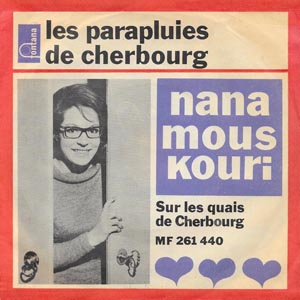
"Les parapluies de Cherbourg"
in six languages

Several of Nana's songs have become multilingual. Among these, "Je reviens chez nous" appears in first position for having been marketed with an identical orchestration in seven languages. In the second place, it would be "Les parapluies de Cherbourg" which she sang in six languages. Let us review its origins and each of its versions here: in French, Japanese, Spanish, Italian, German and English. And why not talk about her meeting and her friendship with the composer?
THE FILM This song is the title of a film which tells the story of two lovers living in Cherbourg, a town in Normandy. Geneviève (Catherine Deneuve) sells umbrellas in a shop and Guy (Nino Castelnuovo) is a mechanic in a gas station. When he is called to do his military service in Algeria, they promise each other eternal Love. It is on a station platform that they part. In the spring of 1964, the film won the Palme d'Or at the Cannes Festival. This is a first for a musical film! Note that the actress’s songs are voiced by Danielle Licari. The music is by composer Michel Legrand and the lyrics by filmmaker Jacques Demy.
|
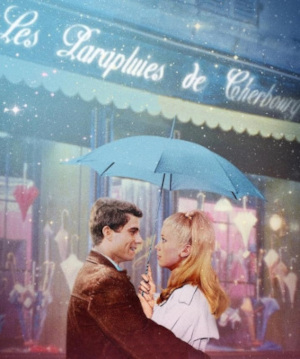 |
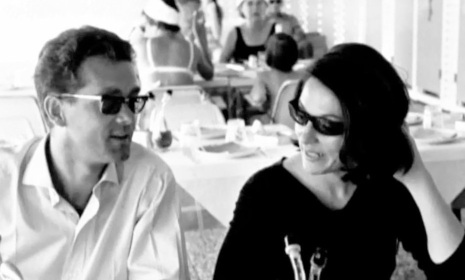 |
THE MEETING Following the enthusiastic reception from critics, Legrand wanted to exploit the songs from the soundtrack and make them known throughout the world. During the festival, he met Nana, the multilingual singer, with whom he had promised to work since her debut. So, he offered her to remake the arrangements of the two main themes with new lyrics: "Sur les quais de Cherbourg" and "Les parapluies de Cherbourg".
|
A few weeks later, they met at the studio to record the two songs. The meeting between the two artists was exquisite. Together, they shared their Love for music. Their perfectionism will lead them to repeat the experience for other recordings.
LES PARAPLUIES DE CHERBOURG In France, both songs appeared on an EP in July 1964 and later on a LP. Alone, "Les parapluies de Cherbourg" made her sell a lot of records and reach a new audience seduced by her perfect diction. Until 1967, Nana sang it several times in TV shows, including a duet with Sacha Distel. In Quebec, those who discovered Nana thanks to this song will consider it for a long time as her great success. As in most other languages, the title has nothing to do with the lyrics. To make the link, it is necessary to know the story. Those who ignore it call it: "Je ne pourrai jamais vivre sans toi" ou "Mon amour, ne me quitte pas".
|
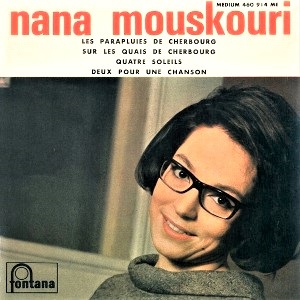 |
|
SHERUBÛRU NO AMAGASA That a French song is adapted into an Asian language is noteworthy. In order to ensure the correct pronunciation of Nana, two representatives of the Japanese Embassy attended the recording. It should be noted that the Japanese people are interested in European culture and love songs from the movies. The 45 rpm came out in February 1965. On the cover, we recognize the sequence of the film where the couple hug in front of a fence. In the recording, Westerners can understand: "Oh! Mon amour" and "Oh! Je t’aime" inserted into a Japanese text. Over the years, Nana's French version, mostly, will be included in several albums. |
LOS PARAGUAS DE CHERBURGO Just before leaving for a long summer tour of North America with Harry Belafonte, Nana recorded versions of her greatest hits in several languages. This is how her first recording in Spanish appeared. It was released as an EP in Spain and as a single in Mexico and Peru. On each, it is mentioned that she sings in Spanish. Since Nana had not yet been to Latin America, there was no real promotion. We therefore had to wait for the release of her Spanish Integral in 2008 to easily get this recording. |
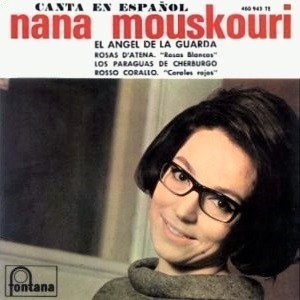 |
|
I PARAPIOGGIA DI CHERBOURG After Japanese and Spanish, Nana dedicated herself to the language of Dante. She recorded two versions, of which is a shortened one starting with the chorus. The text is similar to that in Spanish and French. The song appeared in the album "In Italia" and on a single. There, it’s one of her best known. In fact, Nana performed it on national television. "I parapioggia di Cherbourg" was also covered with other lyrics by various performers including Fausto Cigliano and Nicola D’Alessio. |
EINEN SOMMER LANG In the early 1960s, Germany was the country where Nana sold the most records. This is why most of her great hits have been translated into Goethe's language. "Les parapluies de Cherbourg" is no exception. There, its title has nothing to do with that of the film. It refers to summer rather than the city and the lyrics evoke lost happiness and faithfulness. "Einen Sommer lang" was published in January 1966 only on her second German LP. However, this potential song wasn't released as a single like the previous ones. |
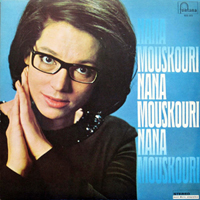 |
|
I WILL WAIT FOR YOU The title of the sixth version, in English, does not mention either the umbrellas or Cherbourg. It was inspired by the segment: "Mon amour, je t'attendrai toute ma vie" (My Love, I will wait for you forever). Nana sang it in duet with Michel Legrand in her 1973 TV series. And, a year later, solo. This was not released on disc. And in her concerts, Nana always performs it in the original language. No doubt this is to preserve its French cachet? |
Even if we cannot prove it, it is quite right to believe that the English version has been recorded in the studio. How can we say the opposite if we consider all the others? The decision not to bring it to market was probably up to her record company. Note that at this time, Nana had just recorded an album with pianist Bobby Scott. The various franchises have perhaps rather preferred to invest in this big production. One thing is certain, if her version had appeared a few years later, when Nana was breaking through in Anglo-Saxon countries, one can imagine the success and the impact it would have had. We only have to think of the great performers like Connie Francis, Petula Clark, Johnny Mathis or Frank Sinatra who have covered it in the language of Shakespeare.
FRIENDSHIP WITH THE COMPOSER Before offering her this melody, Michel Legrand knew that a voice was needed to interpret it. And he was not wrong since it became her first great success of French origin. Over the years, the composer made several other recordings with Nana. He also accompanied her on piano and sang with her on television. Legrand is one of her musical influences and for Nana he was a master. The two remained friends until the end. In addition, she participated in her posthumous tribute at the Grand Rex in 2019. |
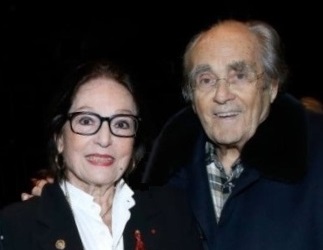 |
ONE OF HER GREATEST SONGS
When we listen to "Les parapluies de Cherbourg", we cannot help but be taken by Nana's sensitivity. The melody is loved by the general public and more by those who have a weakness for jazz. With its touching lyrics, it became one of her greatest songs. Although Nana has recorded it in several languages, it is the French version that remains the most widespread. This proves her attachment to France, her second homeland.